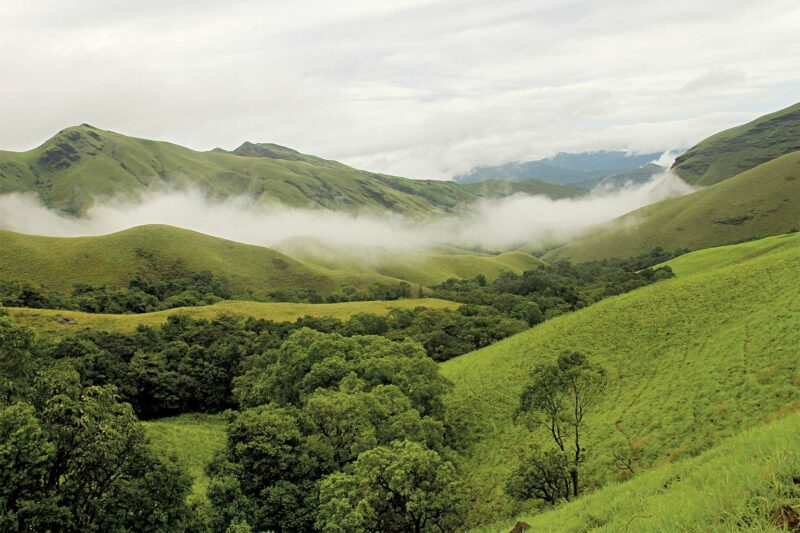
Hey Hi! I am a Shola tree. In groups, we form the Shola forest (Solaivanam in Tamil). We are a native species of the Nilgiris. Did you know, we Sholas act as ‘overhead water tanks’ and form the main source of water for South India? Wonder how? Let me tell you.
We, the Shola forest, have a higher water retention capacity than any other soil. Hence, we retain water from the monsoon. And then we slowly release the retained water in the year’s course. This forms beautiful small streams. These streams are the source of water in rivers like the Cauvery, Thamirabarani and Vaigai. Thus, we act as an ‘overhead water tank’—interesting right?
Let me tell you one more thing that is special about us. In general, mountains are covered in grasslands and trees never grow on mountain tops. But we Sholas grow at an altitude above 2,000 metres above sea-level, making us unique. But sadly, due to the introduction of alien plant species and annual fire occurrences now, we have begun to shrink.
Alien species like the sticky snakeroot, gorse and scotch broom, which were introduced during British rule, have encroached upon our grasslands. Also, tree species such as acacia, pine, cypress and eucalyptus were introduced from Australia. As the alien species grew, our Shola forests and grasslands gradually degraded and shrank.
In addition to this, unscientific agricultural practices like growing tea on the slopes, cattle grazing and fuel wood collection have also become serious causes of our degradation. Fire is also one of the major factors, which not only depletes our growth, but also facilitates the seed germination of fast-invading weed plant lantana by breaking seed dormancy. Oh! Don’t you know this silent killer, lantana? Let me tell you about this villain.
Lantana camera is an ornamental plant introduced to India by foreign invaders. Are you saying it is just a small ornamental plant? What threat can it bring? Wait! Let me tell you. This lantana species has now escaped our gardens and has taken over our entire ecosystem. It is spreading faster than the coronavirus. I heard it has been declared as one of the world’s 10 worst invasive species and a species of high concern for India.
Do you know what this small guy can do? Lantana competes with native plants for space and resources and also alters the nutrient cycle in soil. So gradually it spreads its kingdom and kills native plants. They say more than 44% of the forest area across India is now threatened with lantana invasion. This lantana grows extensively and creates a mat-like structure over and above the Shola forest, thus blocking the sunlight we get. Also, during forest fires, lantanas increase the intensity of forest fires from top to bottom because of their extensive growth. You know what! After the forest fire, our Sholas trees burn to ashes, but the dormant Lantana seeds get active in the forest fire and their growth doubles up. Thus, this sweet-looking small villain is a significant threat to our Shola family. Never ever buy him to decorate your garden, friends.
Our Shola-grassland ecosystem, which acts as the Nilgiris’ overhead water tank and the water source for the Cauvery Delta, can only be saved with the involvement and cooperation of the common public, students like you and nature enthusiasts.
Protect us to serve you and the future.































